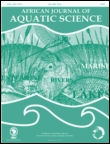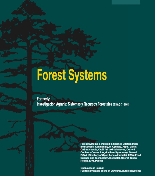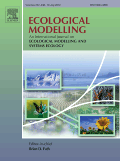
Ecological Indicators
metrics 2024
Transforming ecological data into actionable solutions.
Introduction
Ecological Indicators, published by Elsevier, is a prestigious journal dedicated to advancing the fields of ecology and environmental science. With an impressive impact factor and ranked in the Q1 quartile for both Ecology and Decision Sciences categories, the journal serves as a vital resource for researchers and professionals aiming to apply ecological knowledge to real-world problems. The journal covers a broad scope of topics within ecological indicators, aiming to provide comprehensive insights into biodiversity, ecosystem health, and sustainability metrics. Founded in 2001 and continuing through 2024, Ecological Indicators has established itself as a leader in disseminating significant research and innovative findings. The journal's standing is reflected in its remarkable Scopus ranks, placing it among the top percentile in its respective categories. Authors are encouraged to submit their work to share vital findings with an engaged audience of researchers, professionals, and dedicated students, ensuring the continued relevance and impact of ecological research on global environmental policies and practices.
Metrics 2024
 1.63
1.63 7.00
7.00 6.60
6.60 183
183Metrics History
Rank 2024
Scopus
IF (Web Of Science)
JCI (Web Of Science)
Quartile History
Similar Journals

Ecological Processes
Advancing ecological understanding for a sustainable future.Ecological Processes, published by Springer, is a premier open-access journal dedicated to advancing the understanding of ecological modeling and ecological processes. With a significant impact factor evidenced by its prestigious Q1 ranking in both Ecological Modeling and Ecology categories, as well as impressive Scopus rankings—41st out of 461 in Environmental Science and 7th out of 41 in Ecological Modeling—this journal is a vital resource for researchers, professionals, and students alike. Established in 2012 and operating under an open-access framework since its inception, Ecological Processes strives to provide a platform for high-quality research that addresses critical ecological challenges, ensuring wide dissemination of its articles to a global audience. The journal's focus encompasses various aspects of ecological modeling as well as practical implications for managing natural resources, making it an essential publication for anyone interested in the dynamics of ecological systems and their implications for sustainability.

AFRICAN JOURNAL OF AQUATIC SCIENCE
Advancing aquatic knowledge for a sustainable future.AFRICAN JOURNAL OF AQUATIC SCIENCE, published by TAYLOR & FRANCIS LTD, is a premier scholarly journal dedicated to the field of aquatic science, ecology, and environmental management, playing a crucial role in advancing research and knowledge in these vital areas. With an impressive Q2 ranking in both Aquatic Science and Ecology, Evolution, Behavior and Systematics, the journal seeks to publish high-quality research encompassing a wide range of topics related to freshwater and marine ecosystems, including biodiversity, conservation strategies, and the impacts of climate change. Featuring a rich history of publication from 2000 to 2024, the journal not only embraces rigorous peer review but also aims to foster collaboration and dialogue among researchers, practitioners, and students interested in aquatic environments. Readers will find that the journal’s commitment to impactful scientific communication is reflected in its notable rankings within the Scopus database, making it an essential resource for those engaged in aquatic research and management.

Global Ecology and Conservation
Empowering conservation through open-access research.Global Ecology and Conservation, published by Elsevier, stands as a premier open-access journal dedicated to advancing the field of ecology and conservation science. Since its inception in 2014, the journal has facilitated the dissemination of high-quality research, fostering critical dialogue on ecosystem management, biodiversity preservation, and sustainability practices across the globe. With a remarkable ranking within the top quartiles (Q1) in various categories including Ecology, Evolution, Behavior and Systematics, and Nature and Landscape Conservation, it is positioned among the leading resources for researchers and professionals alike. The journal has garnered a notable impact, ranking #65 out of 721 in Ecology, and houses articles that are vital to understanding and addressing the pressing environmental challenges of our time. Available in an open-access format, researchers can freely access and share vital findings, promoting a collaborative approach to ecological research. Global Ecology and Conservation is not just a publication; it is a critical tool for innovation and advocacy in conservation, poised to inspire the next generation of environmental stewards.

Forest Systems
Transforming insights into action for forest sustainability.Forest Systems, an esteemed open-access journal published by CONSEJO SUPERIOR INVESTIGACIONES CIENTIFICAS-CSIC in Spain, has been a dedicated platform for advancing knowledge in the fields of ecology, forestry, and soil science since its inception in 1991. With an ISSN of 2171-5068 and E-ISSN 2171-9845, the journal is committed to disseminating high-quality research that addresses critical issues related to forest ecosystems and their management. Forest Systems is positioned within the Q4 category in Ecology, Evolution, Behavior and Systematics, and Q3 in both Forestry and Soil Science, evidencing its growing influence and relevance in these disciplines. Researchers will find a rich repository of articles that not only contribute significantly to academic discourse but also foster practical solutions to contemporary environmental challenges. As it converges from 2010 to 2024, the journal aims to enhance its outreach and impact, facilitating access for professionals, students, and policymakers committed to sustainable forest management and ecological conservation.

Ecological Solutions and Evidence
Bridging science and application for environmental impact.Ecological Solutions and Evidence, published by WILEY, stands as a leading platform in the field of ecology, environmental science, and sustainability, with a commendable reputation starting from its inception in 2020. Operating under rigorous academic standards, this journal has achieved notable distinctions by securing a Q1 category ranking in Ecology, Management, Monitoring, Policy and Law, and Nature and Landscape Conservation, making it an invaluable resource for researchers seeking to address pressing environmental challenges. With a current impact factor reflective of its influential articles, the journal features an international scope, focusing on innovative solutions derived from empirical evidence. Accessible to a global audience, the journal encourages open discourse in the field, further supporting researchers, professionals, and students striving to foster ecological sustainability and informed policy-making. Published in the United Kingdom, it aims to bridge the gap between science and application in real-world contexts, promoting actionable insights and interdisciplinary collaboration.

Regional Environmental Change
Bridging Science and Policy for a Greener FutureRegional Environmental Change, published by SPRINGER HEIDELBERG, is a leading journal dedicated to the critical field of Environmental Science, specifically focusing on the global and planetary changes affecting our regional environments. Since its inception in 2005 and continuing through 2024, the journal has been a pivotal platform for disseminating cutting-edge research, insights, and methodologies that address pressing environmental issues. With an impressive Scopus rank, placing it in the top 30% of journals in its category, Regional Environmental Change (ISSN: 1436-3798; E-ISSN: 1436-378X) showcases high-quality academic articles that engage with the multifaceted impacts of environmental shifts, providing researchers, professionals, and students with vital knowledge and data. Although the journal does not currently offer Open Access, it remains a crucial resource for those committed to understanding and mitigating the effects of environmental change on regional ecosystems and communities.

ECOLOGICAL MODELLING
Bridging theory and application in ecological modeling.ECOLOGICAL MODELLING, published by Elsevier, is a premier international journal dedicated to advancing the field of ecological modeling. Established in 1975, this reputable journal has consistently served as a vital platform for researchers, professionals, and students alike, reflecting the dynamic nature of ecological research and its applications. With an impressive impact factor, currently placing it in the Q2 quartile for Ecological Modeling and in the prestigious Q1 quartile for Ecology, ECOLOGICAL MODELLING ranks prominently in the scientific community, positioned at #91/461 in Environmental Science - Ecology and #14/41 in Environmental Science - Ecological Modeling according to Scopus rankings. The journal seeks to publish high-quality, interdisciplinary research that enhances understanding and predictive capacity regarding ecological processes and their integration into real-world applications. While the journal does not currently offer open access, it remains a cornerstone for knowledge dissemination within the ecological community, ensuring that your valuable research reaches a wide audience.

MARINE AND FRESHWATER RESEARCH
Pioneering insights into aquatic ecology and sustainability.Marine and Freshwater Research is a prestigious journal published by CSIRO PUBLISHING that serves as a key platform for the dissemination of cutting-edge research in the fields of Aquatic Science, Ecology, and Oceanography. With an impactful presence since its inception in 1948, the journal provides critical insights into the dynamics of freshwater and marine ecosystems, promoting interdisciplinary approaches that contribute to our understanding of biodiversity and sustainability. Currently ranked in the Q2 category across major scientific domains, including Ecology and Aquatic Science, it enjoys a robust academic reputation supported by impressive Scopus rankings, such as Rank #66/247 in Aquatic Science and Rank #44/145 in Oceanography, reflecting its high citation impact and relevance. While offering a subscription-based access model, the journal remains dedicated to fostering dialogue and innovation within the scientific community, aiming to bridge the gap between research findings and practical applications in environmental management. Located in Australia, Marine and Freshwater Research is an essential resource for researchers, professionals, and students dedicated to exploring the complexities of aquatic ecosystems and advocating for their preservation.

Journal of Fish and Wildlife Management
Innovating wildlife management for a sustainable tomorrow.The Journal of Fish and Wildlife Management, published by the U.S. Fish & Wildlife Service, serves as a vital resource for scholars, researchers, and professionals in the fields of Animal Science, Ecology, and Conservation Biology. With its ISSN 1944-687X, this esteemed journal has been disseminating critical research findings since 2010, contributing significantly to the understanding of fish and wildlife conservation practices and their ecological impacts. Despite its Q3 category rankings in various disciplines as of 2023, it provides a platform for innovative research that influences policy and management strategies for biodiversity conservation. The journal, although not open access, remains committed to advancing the scientific discourse surrounding wildlife management with articles that emphasize practical conservation efforts and ecological sustainability. Readers can expect a diverse range of articles that promote best practices in the management and conservation of fish and wildlife resources, furthering our collective mission of preserving ecological health and biodiversity for future generations.

ENVIRONMENTAL MANAGEMENT
Fostering dialogue on sustainable environmental practices.ENVIRONMENTAL MANAGEMENT, published by Springer, stands at the forefront of advancing sustainability and ecological stewardship in the fields of Ecology, Global and Planetary Change, and Pollution. With an impressive tracking history from 1977 to 2024 and prestigious quartile rankings reflecting its significant impact (Q1 in Ecology and Q2 in both Global and Planetary Change and Pollution), this journal engages a wide range of stakeholders, including researchers, policymakers, and environmental professionals. The journal is a vital resource for those dedicated to addressing pressing global environmental challenges, publishing rigorous interdisciplinary research that informs policy and practice. While it does not offer open access, its content remains accessible through institutional subscriptions. Located in the heart of New York, ENVIRONMENTAL MANAGEMENT is dedicated to fostering a substantive dialogue on innovative approaches to environmental preservation and management.